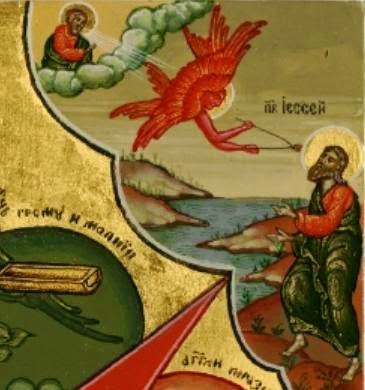God of Powers
A mosaic of a Seraph in the Hagia Sophia, Constantinople
"Lord, God of the Powers, blessed is the man who hopes upon You."--Ps 83:13
"Holy, Holy, Holy are You, Lord Sabaoth": so we acclaim the Lord during the Triumphant Hymn, the Hymn of the Bodiless Hosts. But what does that word "Sabaoth" mean? It means that the Lord is powerful, He is great, and He is worthy to praised by all of creation, not just men.
The first section of the Triumphant Hymn itself was revealed to Isaiah the prophet: "I saw the Lord seated on a high and uplifted throne, and full was the house of His glory. And Seraphim stood surrounding Him...and they cried out another to another and said: 'Holy, Holy, Holy is Lord Sabaoth, full is all the earth of His glory.'" These are the words as found in the Greek, and yet even the great seventy translators could find no way to express parts of this vision in the Greek tongue: they had to leave the words in the original Hebrew, as Isaiah recorded them. For "Seraphim," "burning ones," is no Greek word, and neither is "Sabaoth." Their appearance and their title for the Lord is too great to be expressed in any but the Hebrew tongue. Yet Sabaoth must have a meaning, and so it does. We can see this in the Psalms.
At the conclusion of Psalm 83, where the Hebrew speaks to "Adonai Tsavaoth" (Lord Sabaoth), the Greek translates, "Lord, the God of dynameon." One can easily see some hints of meaning in this: we think of words like "dynamo" or "dynamic" in English, rooted in the Greek dynamis, which means power. So He is the God of Powers. He is not just a powerful God, but He is God of Powers. What does this mean? He has control over the powers. It is true: for does not He stretch forth Heaven like a tent and use the earth as His footstool? Does He not have authority over all the nations of the earth, nations He gives to His Son as an inheritance? Is He not the One Who declares, "For, behold! I am He Who makes thunder firm and creates spirit and announces to men His Christ, Who makes morning and fog and sends it upon the heights of the earth: Lord the God the Pantokrator is His name." Did He not reveal Himself to Job in the cloud as the mighty one? Did not He destroy all the living from the face of the earth save the Noah and his family? Indeed, the Lord is a Mighty One, He is indeed Pantokrator, He is indeed God of Powers, for all powers are His.
Yet there is another way we can understand this, for there are those referred to as powers: I speak of the Bodiless Ones. In this way, Lord Sabaoth becomes "Lord of Hosts," the Lord of the heavenly hosts of angels, in all their varied choirs. All of them He rules, and so they all praise Him, as they did in the sight of Isaiah. When those ministering spirits are not assisting us in our salvation, they are standing before the Lord, ceaselessly praising Him: "Holy God, Holy and Mighty, Holy and Immortal! Holy, Holy, Holy, Lord Sabaoth!" They praise the Trinity of Persons in their thrice-holy hymn, and we join that hymn in the liturgy. We join the countless hosts of Bodiless Powers, thousands of angels, tens of thousands of archangels, cherubim and seraphim, six-winged, many-eyed, who soar aloft on their wings.
So let us hope in the Lord Sabaoth, the God of Powers and the God of Hosts. Though His might is beyond understanding, and He rules all, He deigned to condescend to our lowliness, to accept the struggles of the flesh for our salvation. Through the might of His glory working in our lowly state He burst the bonds of death and conquered the enemy of men, so that we can join the angels, the hosts of Bodiless Powers, to ever praise the exalted and numinous One: "Holy, Holy, Holy is Lord Sabaoth: full are heaven and earth of Your glory, Hosanna in the highest!"
A Seraph cleanses the lips of the Prophet Isaiah
Text ©2014 Brandon P. Otto. Licensed via CC BY-NC. Feel free to redistribute non-commercially, as long as credit is given to the author.



Comments
Post a Comment